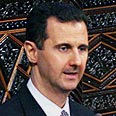
There is ''a real opportunity'' for Syria and Israel to resume peace talks with help from the United States, an influential US lawmaker said Saturday.
Senator Arlen Specter spoke in Damascus shortly after arriving for a two-day visit with Rep. Patrick Kennedy, a member of the US House Appropriations Committee.
''I think there is a very important moment in the Middle East and there is a real opportunity if the parties are ready to move,'' Specter said. ''It's up to the parties. It's up to Syria and Israel, but the United States, I think, is in the position to be helpful.''
Specter, a Republican from Pennsylvania, was scheduled to meet Syrian President Bashar Assad and Foreign Minister Walid al-Moallem on Sunday to discuss the stalled Middle East peace process and strained US-Syrian relations.
Specter, a member of the US Senate Appropriations Committee, declined to confirm reports that he would convey a message to Assad from Israeli Prime Minister Ehud Olmert on resuming peace talks between the two countries.
''I think that is something I should talk to President Assad about before I talk to the media,'' he said.
Specter, who met Olmert Wednesday, told reporters in Jerusalem that he would encourage Assad to launch peace talks with Israel.
He said he is convinced both countries want to restart a dialogue.
''Prime Minister Olmert told us that he's interested, that he's looking for a signal from Syria,'' he said.
In 2000, formal US-sponsored Israel-Syria talks neared agreement but broke down over final border and peace arrangements.
'Syrian envoy confirmed Damascus is interested'
Specter said Syrian Deputy Foreign Minister Faisal Mekdad had told him on the sidelines of last month's
Mideast peace conference in Annapolis, Maryland, that Syria ''is interested in the negotiations.''
Syria attended the US-brokered Mideast conference after receiving assurances that the issue of the Israeli-occupied Golan Heights would be on the agenda.
Relations between Syria and the US appeared to warm briefly following Syria's attendance at the Annapolis conference, which was widely seen as an attempt to gain favor with Washington.
But both sides have since lashed out at one another, each accusing the other of meddling in Lebanon, where the Western-backed government is locked in a political standoff with the pro-Syrian opposition.
The US disapproves of Syrian meddling in Lebanon, Damascus' support for anti-Israel militant groups and its alliance with Iran.
Last week, US President George W. Bush rejected dialogue with the Syrian leader, saying his ''patience ran out on President Assad a long time ago.''















